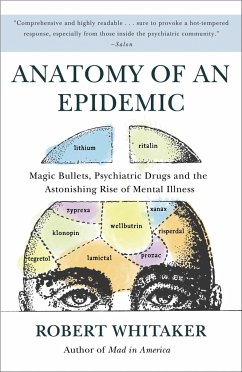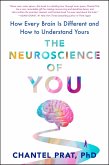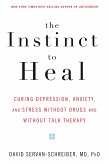Updated with bonus material, including a new foreword and afterword with new research, this New York Times bestseller is essential reading for a time when mental health is constantly in the news.
In this astonishing and startling book, award-winning science and history writer Robert Whitaker investigates a medical mystery: Why has the number of disabled mentally ill in the United States tripled over the past two decades?
Interwoven with Whitaker s groundbreaking analysis of the merits of psychiatric medications are the personal stories of children and adults swept up in this epidemic. As Anatomy of an Epidemic reveals, other societies have begun to alter their use of psychiatric medications and are now reporting much improved outcomes . . . so why can t such change happen here in the United States? Why have the results from these long-term studies all of which point to the same startling conclusion been kept from the public?
Our nation has been hit by an epidemic of disabling mental illness, and yet, as Anatomy of an Epidemic reveals, the medical blueprints for curbing that epidemic have already been drawn up.
Praise for Anatomy of an Epidemic
The timing of Robert Whitaker s Anatomy of an Epidemic, a comprehensive and highly readable history of psychiatry in the United States, couldn t be better. Salon
Anatomy of an Epidemic offers some answers, charting controversial ground with mystery-novel pacing. TIME
Lucid, pointed and important, Anatomy of an Epidemic should be required reading for anyone considering extended use of psychiatric medicine. Whitaker is at the height of his powers. Greg Critser, author of Generation Rx
Hinweis: Dieser Artikel kann nur an eine deutsche Lieferadresse ausgeliefert werden.
In this astonishing and startling book, award-winning science and history writer Robert Whitaker investigates a medical mystery: Why has the number of disabled mentally ill in the United States tripled over the past two decades?
Interwoven with Whitaker s groundbreaking analysis of the merits of psychiatric medications are the personal stories of children and adults swept up in this epidemic. As Anatomy of an Epidemic reveals, other societies have begun to alter their use of psychiatric medications and are now reporting much improved outcomes . . . so why can t such change happen here in the United States? Why have the results from these long-term studies all of which point to the same startling conclusion been kept from the public?
Our nation has been hit by an epidemic of disabling mental illness, and yet, as Anatomy of an Epidemic reveals, the medical blueprints for curbing that epidemic have already been drawn up.
Praise for Anatomy of an Epidemic
The timing of Robert Whitaker s Anatomy of an Epidemic, a comprehensive and highly readable history of psychiatry in the United States, couldn t be better. Salon
Anatomy of an Epidemic offers some answers, charting controversial ground with mystery-novel pacing. TIME
Lucid, pointed and important, Anatomy of an Epidemic should be required reading for anyone considering extended use of psychiatric medicine. Whitaker is at the height of his powers. Greg Critser, author of Generation Rx
Hinweis: Dieser Artikel kann nur an eine deutsche Lieferadresse ausgeliefert werden.
Why are so many more people disabled by mental illness than ever before? Why are those so diagnosed dying 10-25 years earlier than others? In Anatomy of an Epidemic investigative reporter Robert Whitaker cuts through flawed science, greed and outright lies to reveal that the drugs hailed as the cure for mental disorders instead worsen them over the long term. But Whitaker s investigation also offers hope for the future: solid science backs nature s way of healing our mental ills through time and human relationships. Whitaker tenderly interviews children and adults who bear witness to the ravages of mental illness, and testify to their newly found aliveness when freed from the prison of mind-numbing drugs. Daniel Dorman, M.D., Clinical Assistant Professor of Psychiatry, UCLA School of Medicine and author of Dante s Cure: A Journey Out of Madness
This is the most alarming book I ve read in years. The approach is neither polemical nor ideologically slanted. Relying on medical evidence and historical documentation, Whitaker builds his case like a prosecuting attorney. Carl Elliott, M.D., Ph.D., Professor, Center for Bioethics, University of Minnesota and author of Better than Well: American Medicine Meets the American Dream
Anatomy of an Epidemic investigates a profoundly troubling question: do psychiatric medications increase the likelihood that people taking them, far from being helped, are more likely to become chronically ill? In making a compelling case that our current psychotropic drugs are causing as much if not more harm than good, Robert Whitaker reviews the scientific literature thoroughly, demonstrating how much of the evidence is on his side. There is nothing unorthodox here this case is solid and evidence-backed. If psychiatry wants to retain its credibility with the public, it will now have to engage with the scientific argument at the core of this cogently and elegantly written book. David Healy, M.D., Professor of Psychiatry, Cardiff University and author of The Antidepressant Era and Let Them Eat Prozac
Anatomy of an Epidemic is a splendidly informed, wonderfully readable corrective to the conventional wisdom about the biological bases and biological cures for mental illness. This is itself a wise and necessary book essential reading for all those who have experienced, or care for those who have experienced, mental illness which means all of us! Robert Whitaker is a reliable, sensible, and persuasive, guide to the paradoxes and complexities of what we know about mental illness, and what we might be able to do to lessen the suffering it brings. Jay Neugeboren, author of Imagining Robert and Transforming Madness
Every so often a book comes along that exposes a vast deceit. Robert Whitaker has written that sort of book. Drawing on a prodigious quantity of psychiatric literature as well as heart-rending stories of individual patients, he exposes a deeply disturbing fraud perpetrated by the drug industry and much of modern psychiatry at horrendous human and financial cost to patients, their families, and society as a whole. Scrupulously reported and written in compelling but unemotional style, this book shreds the myth woven around today s psychiatric drugs. Nils Bruzelius, former science editor for the Boston Globe and the Washington Post
A devastating critique. . . . One day, we will look back at the way we think about and treat mental illness and wonder if we were all mad. Anatomy of an Epidemic should be required reading for both patients and physicians. Shannon Brownlee, senior research fellow, New America Foundation and author of Overtreated
This is the most alarming book I ve read in years. The approach is neither polemical nor ideologically slanted. Relying on medical evidence and historical documentation, Whitaker builds his case like a prosecuting attorney. Carl Elliott, M.D., Ph.D., Professor, Center for Bioethics, University of Minnesota and author of Better than Well: American Medicine Meets the American Dream
Anatomy of an Epidemic investigates a profoundly troubling question: do psychiatric medications increase the likelihood that people taking them, far from being helped, are more likely to become chronically ill? In making a compelling case that our current psychotropic drugs are causing as much if not more harm than good, Robert Whitaker reviews the scientific literature thoroughly, demonstrating how much of the evidence is on his side. There is nothing unorthodox here this case is solid and evidence-backed. If psychiatry wants to retain its credibility with the public, it will now have to engage with the scientific argument at the core of this cogently and elegantly written book. David Healy, M.D., Professor of Psychiatry, Cardiff University and author of The Antidepressant Era and Let Them Eat Prozac
Anatomy of an Epidemic is a splendidly informed, wonderfully readable corrective to the conventional wisdom about the biological bases and biological cures for mental illness. This is itself a wise and necessary book essential reading for all those who have experienced, or care for those who have experienced, mental illness which means all of us! Robert Whitaker is a reliable, sensible, and persuasive, guide to the paradoxes and complexities of what we know about mental illness, and what we might be able to do to lessen the suffering it brings. Jay Neugeboren, author of Imagining Robert and Transforming Madness
Every so often a book comes along that exposes a vast deceit. Robert Whitaker has written that sort of book. Drawing on a prodigious quantity of psychiatric literature as well as heart-rending stories of individual patients, he exposes a deeply disturbing fraud perpetrated by the drug industry and much of modern psychiatry at horrendous human and financial cost to patients, their families, and society as a whole. Scrupulously reported and written in compelling but unemotional style, this book shreds the myth woven around today s psychiatric drugs. Nils Bruzelius, former science editor for the Boston Globe and the Washington Post
A devastating critique. . . . One day, we will look back at the way we think about and treat mental illness and wonder if we were all mad. Anatomy of an Epidemic should be required reading for both patients and physicians. Shannon Brownlee, senior research fellow, New America Foundation and author of Overtreated








